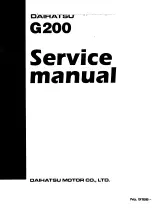
Introduction
The following pages provide
instructions on how to properly
protect the driver, adult passengers,
and teenage children who are large
enough and mature enough to drive
or ride in the front.
See pages 35
-
51 for important
guidelines on how to properly protect
infants, small children, and larger
children who ride in your vehicle.
1. Close and Lock the Doors
After everyone has entered the
vehicle, be sure the doors, the hatch,
and the tailgate are closed and
locked.
Your vehicle has a door and
tailgate open indicator on
the instrument panel to indicate
when a specific door, the tailgate or
the hatch is not tightly closed.
Locking the doors, the hatch, and the
tailgate reduces the chance of
someone being thrown out of the
vehicle during a crash, and it helps
prevent passengers from accidentally
opening a door, the hatch, or the
tailgate and falling out.
Locking the doors, the hatch, or the
tailgate also helps prevent an
outsider from unexpectedly opening
a door when you come to a stop.
See page 80 for how to lock the
doors, and page 61 for how the door
and tailgate indicator system works.
2. Adjust the Front Seats
Adjust the driver's seat as far to the
rear as possible while allowing you to
maintain full control of the vehicle.
Have a front passenger adjust their
seat as far to the rear as possible.
If you sit too close to the steering
wheel or dashboard, you can be
seriously injured by an inflating front
airbag, or by striking the steering
wheel or dashboard.
CONTINUED
Protecting Adults and Teens
11
Driver
and
Passenger
Safety
















































